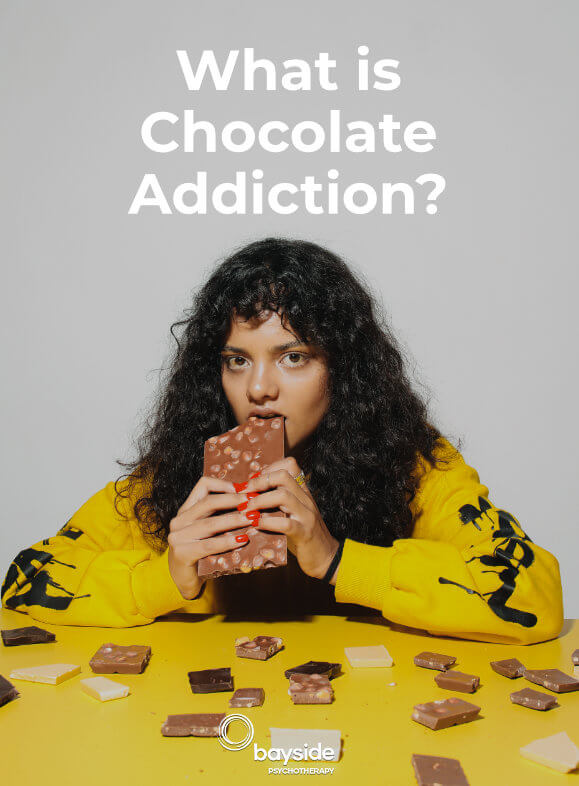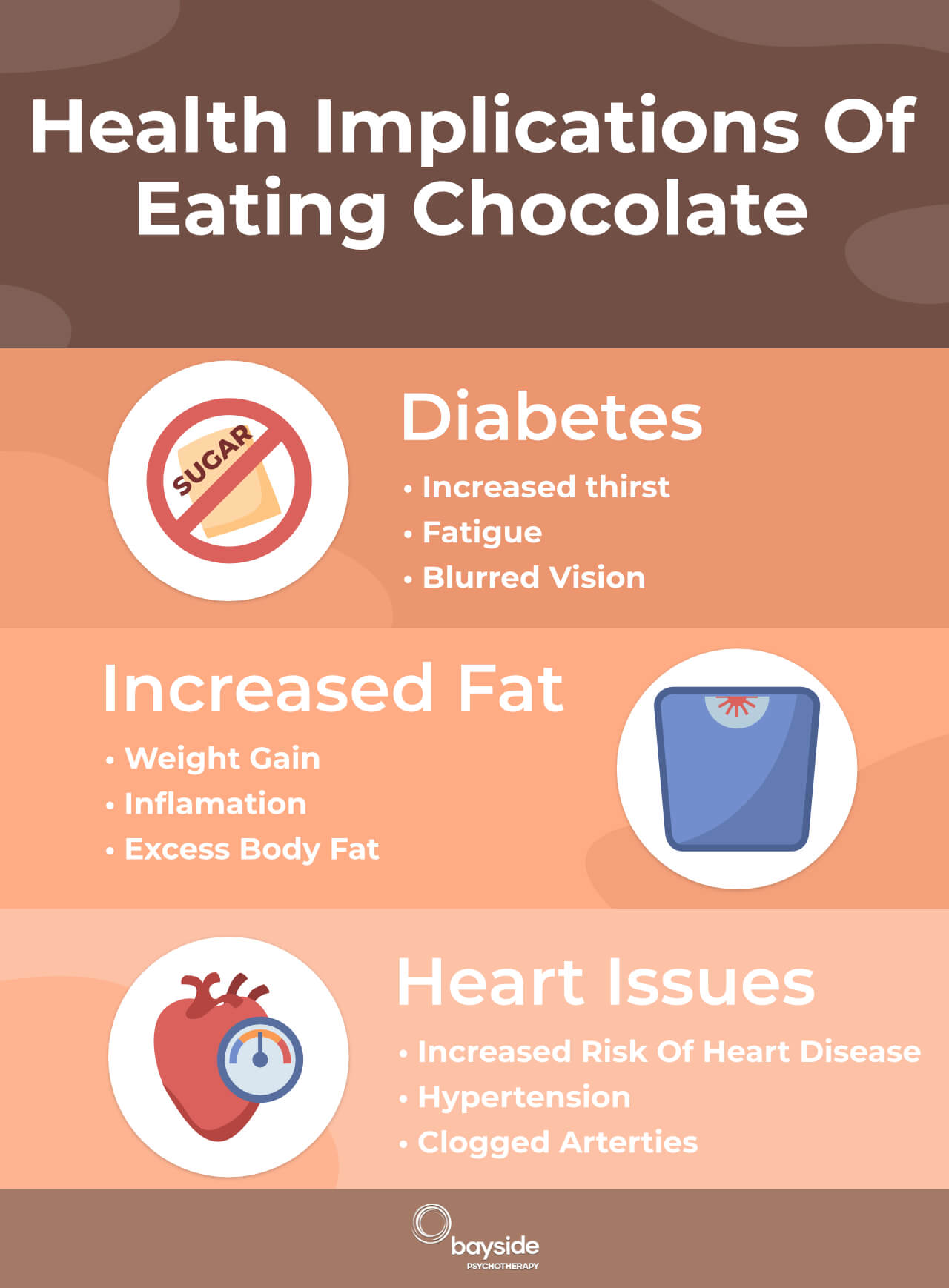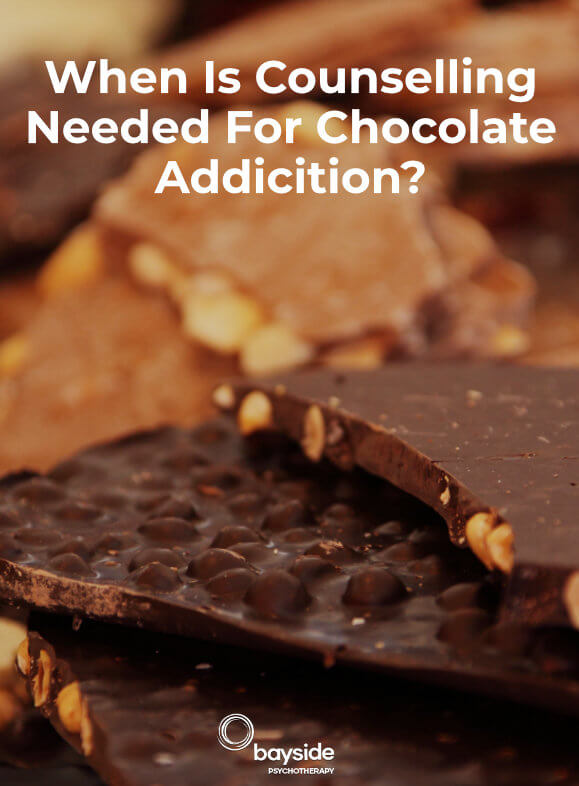
Chocolate addiction is often difficult to overcome without support. It may sound fun, but chocolate addiction can be serious. Uncontrolled consumption of anything is bound to have negative consequences eventually. People become reliant on chocolate for different reasons. The heart of the struggle with chocolate addiction is the conflict between knowing you should stop and, at the same time, craving the sweet rush it gives you. You can become genuinely dependent on that satisfaction spike to change how you feel — temporarily.
But chocolate can never really satisfy your true needs. As the addiction continues untreated, your cravings will increase, along with adverse health outcomes. And because there’s not much stigma attached to eating chocolate, it may be harder to admit that you have a problem.
The trained therapists at Bayside Psychotherapy are here to talk if you’re ready to work towards change. We use a combination of addiction counselling methods and targeted hypnotherapy that may help change patterns of behaviour. We offer sessions either online or face to face at our Highett clinic, depending on the practitioner and your preferences.

What is Chocolate Addiction?
We all love to eat chocolate, it makes us feel good and we might not realise we have become addicted to chocolate. Some of us have more addictive tendencies and end up addicted to it. The craving for chocolate can be beyond one’s control. Chocolate contains chemicals like theobromine and phenylethylamine, which can produce mood-lifting effects, the term “chocolate addiction” is used more informally rather than in a strict medical sense.
Reasons for the Addiction
The deep craving for chocolate stems from various reasons like the taste, the comfort it offers, and especially the mood-altering chemicals inside it. Many people become addicted to chocolate without even realising it until the effects become noticeable.

Can It Become a Problem?
Health Implications
Consuming too much chocolate, especially varieties high in sugar and fat (white chocolate), can lead to weight gain, cavities, and other negative health effects. Eating a lot of chocolate in one sitting can spike your blood sugar levels and cause insulin resistance making you more at risk of developing type 2 diabetes. It can also lead to a sugar addiction.
Negative Impact On Mental Well-being
Sweet cravings for chocolate daily will sap willpower and desire, leading to distraction and interference in a person’s daily life. It is important to reframe how we view chocolate in daily life and to develop a better relationship with chocolate. Too much sugar consumption in the form of chocolate can lead to depressed moods and difficulty controlling hunger.

When is Chocolate Addiction Counselling Necessary?
Uncontrollable Cravings
Many people struggle to overcome chocolate addiction and require intervention to cut chocolate out from their diets, counselling is often used to help an individual build a healthy relationship with chocolate and to lower sugar cravings. Bayside Psychotherapy helps people overcome their addiction to chocolate.
Impact on Daily Life
If the consumption of chocolate is affecting one’s work, relationships, or other essential aspects of life, counselling could be beneficial. An unhealthy relationship with chocolate will affect one’s work, personal relationships and other aspects of life. Hormone disruption, sugar cravings, difficulty regulating hunger, weight gain, inflammation and much more. Sugary foods like chocolate can and do have major impacts on a person’s daily life.
What are the Effects of Chocolate Addiction?
Physical Effects
Chocolate is known to cause weight gain, acne, digestive issues, and an increased risk of conditions like diabetes or heart disease, especially from chocolates high in sugar and fats like white chocolate or milk chocolate.
Psychological Effects
A food addiction to chocolate for emotional comfort leads to mood swings, guilty feelings after eating, or a decreased ability to cope with stress without it, the more stressed the more likely a person is to reach for the nearest chocolate bars.
Do I Have a Chocolate Addiction?
The term “chocoholic” is commonly used humorously to describe a person who loves chocolate. However, there is medical data to confirm the actuality of an addiction to chocolate.
Just like an addiction to an A-class drug, chocolate addictions can cause intense cravings and loss of control over when and how you eat it, despite harmful consequences. Chocolate addiction is a medical condition that may arise from the way chocolate affects brain chemistry. Chocolate contains chemicals that are found in many other stimulants, such as caffeine and theophylline (found in tea leaves).
Do you find yourself hiding your chocolate stash from family and friends? Do you feel guilty after indulging in chocolate? Do you find yourself craving chocolate so much that you can’t go a day without eating it? If you answered yes to any of these, you might have a chocolate addiction.
How Long Does It Take to Treat a Chocolate Addiction?
It’s impossible to say exactly how long your treatment will take since every client’s situation is different. After a couple of sessions, your therapist may be able to uncover the primary reasons for the problem and evaluate how well the treatment is working. They will then have a clearer idea of how much more therapy is indicated to effect lasting change.
You may only need a few sessions to put you on the road towards overcoming chocolate cravings by yourself, depending on the complexity of the problem and your willingness to participate in the process. Others may benefit from regular, ongoing treatment.
How Does Bayside Psychotherapy Approach Addiction Counselling?
In your first session, your therapist will explore your circumstances to be able to put together what they think is the most effective treatment plan for you. The goal of treatment is to help you understand and manage your chocolate addiction by identifying and addressing underlying causes. This insight may help you create a genuine base of personal wellbeing and happiness, so you’re less likely to crave sweet quick fixes. If you can anticipate your triggers, you may be better equipped to resist temptation and break the cycle of chocolate cravings, guilt and disappointment.
Self-hypnosis may also work well when used in conjunction with counselling. You can download our Chocolate Addiction Self Hypnosis recording from our website.
Call us on (03) 9557 9113 or use our contact form for more information about how we may be able to help you. All calls are confidential, and there is absolutely no obligation.
You can also book an appointment by using our online booking form for online appointments. Or, if you prefer, you can book an in-clinic session.
Note: Whilst we will do our best to assist you, client commitment to and participation in the treatment process is essential to optimise results. Although some of our therapists work with people presenting with this condition, no guarantees of any outcomes can be made.
Reception Phone Hours
- – Monday 8:30am to 5:30pm
- – Tuesday 8:30am to 5:30pm
- – Wednesday 8:30am to 5:30pm
- – Thursday 8:30am to 5:30pm
- – Friday 8:30am to 5:30pm
Closed on public holidays
Choose your own date and time for an online or in-clinic session
Therapist Hours
- – Monday 8:00am to 8:00pm
- – Tuesday 8:30am to 8:00pm
- – Wednesday 8:30am to 8:00pm
- – Thursday 8:30am to 8:00pm
- – Friday 8:30am to 8:00pm
- – Saturday 8:00am to 6:00pm
Closed on public holidays





